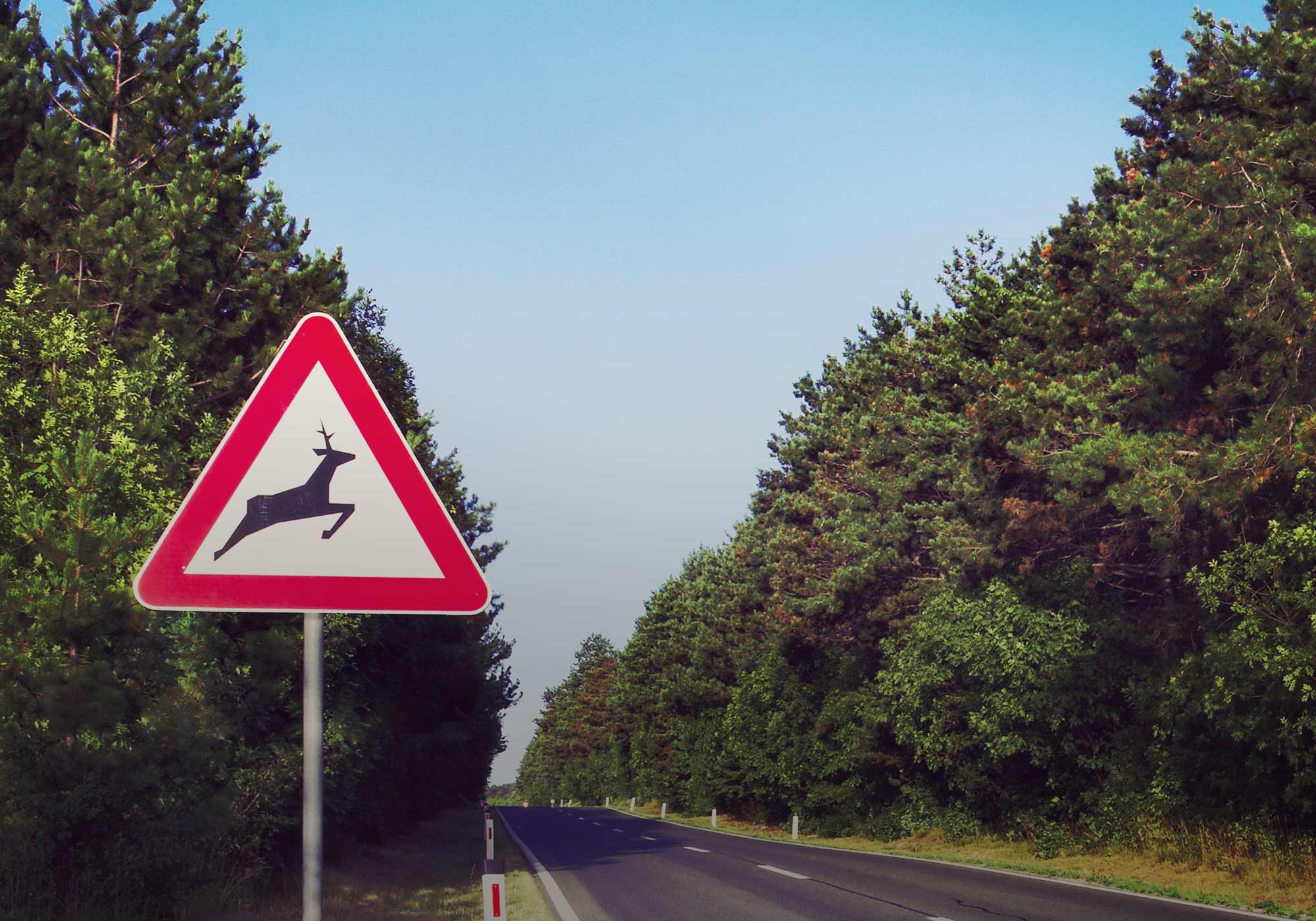While we really hope you never need to know what to do if you accidentally hit an animal when driving, it’s worth having some information just in case.
Stay calm (as much as possible), take deep breaths and take a minute to assess the situation. If you stop, make sure it’s safe to do so and you’re not causing danger to yourself or other road users.
The law: what you need to know
The Road Traffic Act 1988¹ only provides rules for certain types of animals:
- Dogs
- Goats
- Horses
- Cattle
- Donkeys and mules
- Sheep
- Pigs
If you hit one of the above-mentioned animals you are required by law to report it to the police.²
If you hit another type of animal, such as a cat or a fox, you are not required by law to report it but you might want to contact the police anyway.³
Some advice for what to do if you hit an animal
Stop the car
If you have an accident and an animal (even if it’s in someone else’s vehicle) is injured⁴ you must stop, whether it was your fault or not.⁵
Stay at the scene
You need to stay with your car long enough for other people – such as the animal’s owners – to get hold of any details they need.⁶
Approaching the animal
Remember to be aware of your surroundings – keep an eye out for other cars or anything that could put you and other road users in danger.
If you’re approaching an injured animal, it will probably be frightened and might even try to bite or scratch you.⁷
If you realise you have hit someone’s pet, you may want to try and find its tag to get hold of the owner’s details.
Call the police if necessary
Remember if you hit any of the animals listed at the start of this post you are legally required to report the accident to the police.
If you can’t find any information about the animal’s owner, you need to report the accident to a police officer or at your local police station within 24 hours.
If the animal needs urgent care, the police should have a list of vets that can help.⁸
Wild animals
If you find an injured wild animal on the road, try and get an idea of how badly hurt it is.
Then call the RSPCA on 0300 1234 999.⁹ You can find your local vet here. You will not be responsible for covering the vet’s fees.¹⁰
Cats
No one wants to think about his or her cat being harmed, but it’s worth knowing what to do just in case.
Cats Protection says:
If the cat is moveable, take him to a vet and inform the veterinary staff that you are not the owner. If the cat has no identification, spread the word in your neighbourhood that you have discovered an injured cat and taken him to the vet. Putting up some posters may help to inform the owners of their cat’s whereabouts.¹¹
How do I find my local vet?
Find your local vet here.
Deer
Fact: There are around 74,000 accidents involving deer each year in the UK.
You’re more likely to find a deer in the road around May-June and October-November. This is because of the rutting season and young deer dispersing.¹³
Fact: The total vehicle damage from deer-related accidents in the UK equates to £17 million a year.¹²
Here are some tips from the RSPCA:
– Look out for deer warning signs
– Stick to the speed limit
– Take extra care early in the morning and during early evening
– Report collisions to the police
If you’re unfortunate enough to find a deceased animal on the road
Your local council is responsible for removing any animals found on the road. Click here and enter the postcode of your location to find the relevant contact number.
Finding more advice
The RSPCA has some great resources on protecting and caring for animals.
For information on making a claim following damage to your car, check out our guide.
We hope you’re never involved in a car accident with an animal, but you might want to save the RSPCA’s 24-hour advice line number to your phone, just in case: 0300 1234 999.
Sources:
[1] http://www.legislation.gov.uk/ukpga/1988/52/section/170
[2] [3] https://www.askthe.police.uk/content/Q434.htm
[4] [5] [6] http://www.adviceguide.org.uk/england/consumer_e/consumer_cars_and_other_
vehicles_e/consumer_driving_and_parking_e/consumer_driving_e/traffic_accidents.htm
[7] https://www.bluecross.org.uk/1958-2781/basic-first-aid.html
[8] https://www.staffordshire.police.uk/info_advice/crime_prevention/road_safety/collisions
[9] http://www.rspca.org.uk/allaboutanimals/wildlife/injuredanimals
[10] http://content.www.rspca.org.uk/cmsprd/Satellite?blobcol=urldata&blobheader=application
%2Fpdf&blobkey=id&blobnocache=false&blobtable=MungoBlobs&blobwhere
=1232992699451&ssbinary=true
[11] http://www.cats.org.uk/cat-care/cat-care-faqs
[12] http://www.rspca.org.uk/ImageLocator/LocateAsset?asset=document&assetId=1232713931401&mode=prd
[13] http://www.theaa.com/public_affairs/news/deer-collisions.html
